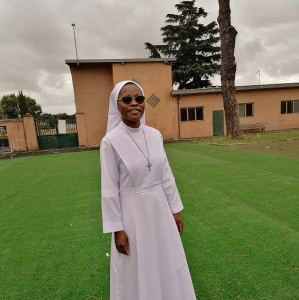9th December 2020 Holy See
Sisters defending human rights: fighting forced marriage in Benin
As British Ambassador to the Holy See I have been privileged to work with some of the 650,000 Catholic women religious who are combating the global issues affecting the world today: from the response to the Covid-19 pandemic to modern slavery, from helping victims of sexual violence in conflict to protecting the planet, women religious are on the frontline.
To mark International Human Rights Defenders’ Day today, I spoke to Sister Hortense, a nun from Benin, about the work of her order addressing forced marriage. 31% of girls in Benin are married before their 18th birthday.

Her order, the Oblates Catechists Little Servants to the Poor (OCPSP), was founded in 1914 to help the widows and orphans of World War I. It comprises 350 nuns operating in Benin, Nigeria, Morocco, Italy, and Colombia.
Sr Hortense told me that growing up she was moved by the fate of girls forcibly married off to older men, and determined to do something about that, so joined the Oblates. In Benin it is common for girls aged 12, 13 or 14 o be given in marriage without their consent. ‘The girls suffer a lot. Love should be reciprocal.’
She related the story of one 14-year-old who was kidnapped with the connivance of her uncle on the way to church. She was tied up and beaten by two men, one of them telling her ‘From today you are my wife’. She escaped by pretending to faint and ran in tears to the sisters. They gave her a home until she was 24 and able safely to return home.
The sisters listen to the girls’ stories and heal their wounds. They run courses to help girls rehabilitate into society. They assist the girls’ mothers, who often underwent forced marriage themselves and help them break the chain of abuse. They intervene with families to stop forced marriages – sometimes risking their own lives.
Girls can stay with the nuns as long as they want to. They receive education and learn skills like sewing and cooking. Some of them choose to be reunited with their families, after marrying a man they have chosen. Others prefer to stay, to help the nuns support other women. If they have been raped, they often do not want to marry.
Why does forced marriage happen? Sister Hortense said it was a tradition that reinforced ties between families; it was seen as a way to maintain family honour by avoiding pregnancy out of wedlock; and it was driven by poverty – young girls were married off to older, richer men. The practice was banned but it persisted. No one wanted to talk about it – and the victims often did not go to the police because they wanted to protect their parents.
The solution? To talk about it. To raise awareness with parents. To make the laws known. To influence the animist religious leaders who blessed the marriages. ‘Awareness raising is the answer. We can all do this together.’
I salute Sister Hortense and the religious women defending the rights of the poorest and most vulnerable around the world.